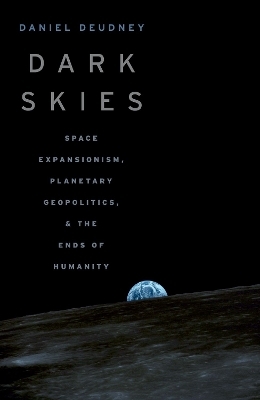
Dark Skies
Oxford University Press Inc (Verlag)
978-0-19-765649-5 (ISBN)
Would-be asteroid collision diverters, space solar energy collectors, asteroid miners, and space geo-engineers insistently promote their Earth-changing mega-projects. Given our many looming planetary catastrophes (from extreme climate change to runaway artificial superintelligence), looking beyond the earth for solutions might seem like a sound strategy for humanity. And indeed, bolstered by a global network of fervent space advocates-and seemingly rendered plausible, even inevitable, by oceans of science fiction and the wizardly of modern cinema-space beckons as a fully hopeful path for human survival and flourishing, a positive future in increasingly dark times.
But despite even basic questions of feasibility, will these many space ventures really have desirable effects, as their advocates insist? In the first book to critically assess the major consequences of space activities from their origins in the 1940s to the present and beyond, Daniel Deudney argues in Dark Skies that the major result of the "Space Age" has been to increase the likelihood of global nuclear war, a fact conveniently obscured by the failure of recognize that nuclear-armed ballistic missiles are inherently space weapons. The most important practical finding of Space Age science, also rarely emphasized, is the discovery that we live on Oasis Earth, tiny and fragile, and teeming with astounding life, but surrounded by an utterly desolate and inhospitable wilderness stretching at least many trillions of miles in all directions. As he stresses, our focus must be on Earth and nowhere else. Looking to the future, Deudney provides compelling reasons why space colonization will produce new threats to human survival and not alleviate the existing ones. That is why, he argues, we should fully relinquish the quest. Mind-bending and profound, Dark Skies challenges virtually all received wisdom about the final frontier.
Daniel Deudney is a professor of political science and international relations at Johns Hopkins University. He has written extensively on international theory, political theory and global issues: nuclear, space, environment and energy. His book Bounding Power: Republican Security from the Polis to the Global Village received the 'Book of the Decade' award from the International Studies Association.
Prologue: MACHINE CIVILIZATION & THE TRANSFORMATION OF THE EARTH
Chapter 1. THE PROMISE OF SPACE REVISITED
Chapter 2. TOWARD AN ASSESSMENT
PART ONE: GEOGRAPHIC & TECHNOLOGICAL HORIZONS
Chapter 3. NEW HEAVENS, NEW EARTH
Chapter 4. TECHNOLOGICAL IMAGINARIES, FEASIBILITIES, SYNDROMES & CATASTROPHES
PART TWO: SPACE EXPANSIONISM & CRITICS
Chapter 5. ABSOLUTE WEAPONS, LIGHTNING WARS & ULTIMATE POSITIONS
Chapter 6. LIMITLESS FRONTIERS, SPACESHIP EARTHS & HIGHER HUMANITIES
Chapter 7. SUPERPOWER RESTRAINTS, PLANETARY SECURITY & EARTH IDENTITY
PART THREE: ASSESSMENT
Chapter 8. GEOGRAPHY, GEOPOLITICS AND GEO-HISTORY
Chapter 9. EARTH SPACE, PLANETARY GEOPOLITICS & WORLD GOVERNMENTS
Chapter 10. SOLAR SPACE, ISLAND EARTH & THE ENDS OF HUMANITY
Conclusion: SPACE FOR EARTH
| Erscheinungsdatum | 19.08.2022 |
|---|---|
| Verlagsort | New York |
| Sprache | englisch |
| Maße | 153 x 238 mm |
| Gewicht | 676 g |
| Themenwelt | Geisteswissenschaften ► Geschichte ► Regional- / Ländergeschichte |
| Sozialwissenschaften ► Politik / Verwaltung ► Europäische / Internationale Politik | |
| Sozialwissenschaften ► Politik / Verwaltung ► Staat / Verwaltung | |
| ISBN-10 | 0-19-765649-8 / 0197656498 |
| ISBN-13 | 978-0-19-765649-5 / 9780197656495 |
| Zustand | Neuware |
| Haben Sie eine Frage zum Produkt? |
aus dem Bereich


